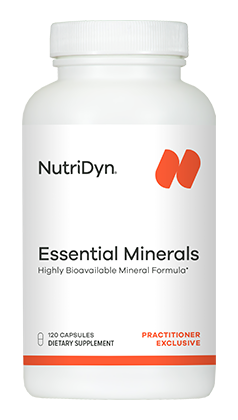| Ingredient | Amount | Daily Value |
|---|---|---|
| Calcium (as microcrystalline hydroxyapatite) | 200 mg | 15% |
| Iodine (as potassium iodide) | 150 mcg | 100% |
| Magnesium (as magnesium aspartate, di-magnesium malate, and citrate) | 400 mg | 95% |
| Zinc (as zinc picolinate) | 20 mg | 182% |
| Selenium (as L-selenomethionine) | 200 mcg | 364% |
| Copper (as copper citrate) | 1 mg | 111% |
| Manganese (as manganese citrate) | 5 mg | 217% |
| Chromium (as chromium polynicotinate) | 200 mcg | 571% |
| Molybdenum (as molybdenum glycinate chelate) | 150 mcg | 333% |
| Potassium (as potassium aspartate and potassium iodide) | 99 mg | 2% |
| Betaine HCl | 100 mg | ** |
| Boron (as boron glycine) | 4 mg | ** |
| Vanadium (as vanadyl sulfate) | 100 mcg | ** |
| *Percent Daily Value (%DV) is based on a 2,000 calorie diet. | ||
| **Daily Value (DV) not established. |
Essential Minerals
Essential Minerals
NutriDyn Essential Minerals is a comprehensive micronutrient formula made with highly bioavailable forms of key minerals. Minerals, such as magnesium and calcium, are required by the body to allow for optimal health and longevity.◆
Minerals are compounds that allow physiological reactions to occur in the body. They often work in conjunction with other essential molecules to help support healthy body function.◆ They also support a multitude of metabolic reactions, particularly by acting as small particles that carry electrical charges, called ions and electrolytes.
The benefits of Essential Minerals supplementation may include:
● Help you meet daily mineral needs◆
● Supports cognitive function and mood◆
● Support healthy skin and bone tissue◆
● Support energy production and vitality◆
● Support healthy immune function◆
● Support healthy gastrointestinal and endocrine function◆







